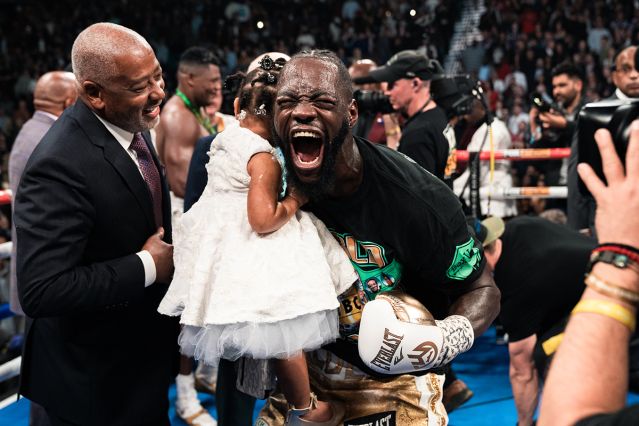Pulling No Punches
Heavyweight boxer Deontay Wilder squares up with vulnerability.
By Tyler Woods published July 5, 2023 - last reviewed on July 5, 2023

American heavyweight Deontay Wilder was not especially boastful or triumphant after knocking out Robert Helenius in October 2022. In fact, he broke down crying out of concern for his opponent, who had been taken to the hospital, and for the health and well-being of boxers in general. Wilder, who held the heavyweight title from 2015 to 2020 and has won 43 matches in his career, recently spoke to PT about his mental health journey, including empathy, meditation, and the benefits of crying.
It’s rare to see a boxer cry out of compassion after a match. What were you feeling after the Helenius fight?
Being a fighter, you go in there and put your life on the line for others’ entertainment. I was speaking also of another fighter, Prichard Colon. [Colon is currently in a vegetative state after an injury suffered in the ring.] Prichard was the breadwinner of his family. Now, he can’t feed himself. To see this young man, his life all of a sudden changed, seemingly in the snap of a finger, that saddened me. Doctors always tell me, “The head is not meant to be hit.” This is a cold business.
Most pro fighters start training as kids, but you didn’t box until you were 20. You were a delivery driver but became an Olympic medalist less than two years later. What was that path like?
Well, it wasn’t that easy. But the whole reason I started boxing was because of my daughter, Naieya Wilder, who was born with spina bifida. We had a big decision to make before she was born, whether to carry on with the pregnancy and go through the different obstacles in life we were going to have to face, or to terminate the pregnancy. We felt she deserved to live, and I decided I was going to take on all the responsibilities that come with taking care of a child with her condition. I started boxing because I needed quick money, something I could do legally to support my child.
You’ve said that the mental health of boxers is visible only behind the scenes. What should people know that they don’t know?
A lot of fighters don’t want to reveal what’s going on with them. They try to be tough, to keep that persona up. But PTSD is very common among fighters. Mental illness is a big thing in boxing. I think a lot of fighters should get checked out.
How do you support other fighters?
We need each other, and we need to show love. It can be words of affirmation or confirmation. One thing is just saying, “Man, I love you! How you doing today?” We need that feeling that somebody loves me. Somebody cares for me. Somebody is thinking about me. I tell fighters I love them or give them my ears because they want to release something. That four-letter word is a powerful word: love.
Your hometown, Tuscaloosa, Alabama, recently unveiled a bronze statue of you. What did that mean for you?
Where that statue lies, the Klan used to hang blacks. Blacks were prohibited from even going in that area unless they were cleaning houses. Up the street, there’s a building where they used to sell slaves. So when I saw old folks, old black people, come up to it, I knew the significance of seeing a statue of a black man in that area. They said they had heard about it, but they had to see this with their eyes. That brought me to tears, and I just couldn’t stop.
You’ve been open about the value of crying.
Crying is cleansing. I hold a lot of stuff in. And when you do that, there could be a time where it’s like a volcano: You’re gonna erupt, and you may not like what you do. It’s a cleanse of my body to remove some of the bad and allow something good to come in.
You built a meditation room in your house. What is your practice like?
Meditation gives me clarity and confirmation. It humbles me. I like to use meditation with visualization: Say I want to win a race, an obstacle course, so I’m visualizing how I want this course to go. I know that there’s a corner right here and a step right there. You’re planning how you want to do it so when you actually get ready to run the race, it’s almost like you’ve done it before.
Is that part of how you prepare for a fight?
When I’m in the ring, there might be thousands of people in the audience, but because of my meditation practice, I’m able to zone out everybody. It’s like smoke that only I can see that blocks out everything else and that gives me peace of mind. A lot of things have lined up for me due to the exercise I put in on my mind, the exercise of my brain.
You’ve spoken about battling depression earlier in your life. What do you do to ward it off and find happiness?
It can be hard to love yourself. I still have my emotional roller coaster, sometimes still feel like I’m not doing enough. One thing I learned is not to let people throw emotional garbage at you, because it will soak in. You’ll start to think, “I can’t do that” or “I am no good.” Some people think having all this money is the prototype for happiness, but they are mistaken. I came to a realization that I don’t need to have all these materialistic things. All I need to be happy is simplicity: to be able to sleep, to eat, to take care of my family.
